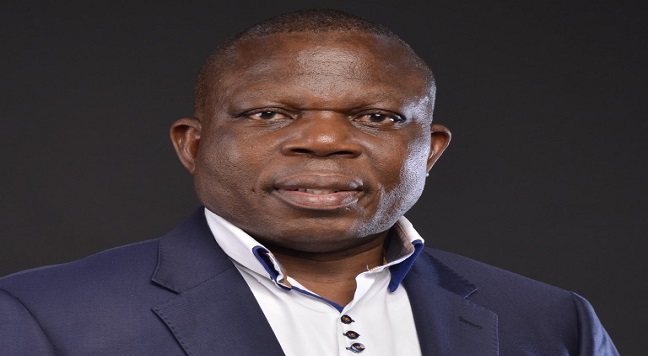News
Nelson Mandela University Confers Honorary Doctorate on Nkemdilim Uwaje Begho

Nelson Mandela University has conferred an Honorary Doctorate in Information Technology on tech expert, Nkemdilim Uwaje Begho, in recognition of her impactful contribution to technology ecosystems and policy development across Africa.

Nkemdilim Uwaje Begho,
The institution in a statement released on Friday said that the award will be conferred at the University’s graduation ceremony on 13 December.
Uwaje Begho, CEO of the Nigeria-based Future Software Resources Ltd., one of Nigeria’s leading digital and technology solutions companies, is a renowned digital transformation and brand marketing expert.
Over the years she has served on the leadership of the Nigerian Economic Summit Group Digital Economy Thematic Group, the Nigerian National IT Software Committee; and the Nigerian Electronic Voting Think Tank.
Her accolades include being on the Forbes List of Top Ten Female Tech Founders in Africa in 2014 and being selected as one of the Obama Africa Leaders in 2019.
She said, “The Honorary Doctorate is very unexpected and it is most gratifying to receive it from a Pan-African institution of Nelson Mandela University’s stature.”
Uwaje Begho said: “We can be proud of Fintech unicorns like Interswitch, Flutterwave and Paystack that successfully paved the way for Nigerian and pan-African payments. However, as a continent our focus should be on innovating around emerging technologies like AI, blockchain, and IoT as they hold immense potential as drivers for sustainable socio-economic development.
“We need to invest in young talent in Africa and a tech-supportive policy environment to ensure we move from consuming technologies to creating them. It’s exciting to see generative AI companies like CDIAL.AI emerging from Africa, founded by Nigeria’s Olayinka Lyinolokan.”
To create an enabling tech environment, “requires policy-making tailored to Africa’s unique environment, not copy-and-paste from countries like India or elsewhere,” she added.
Addressing the international dimension, Uwaje Begho calls for internationally-recognised and enforceable laws and policies, facilitating confidence for investors in companies registered in African countries.
She highlights the missed revenue opportunities when policies and laws governing technology and the startup ecosystem are not consistent, thus forcing startups to register and raise investment in other jurisdictions.
To expand digital access, she stresses the significance of last-mile broadband penetration, to reach all areas in every country in Africa. She underscores the role of private telecom companies in extending broadband infrastructure to rural areas, emphasising the importance of forward-thinking leaders and reasonable right of way charges.
“I am pleased to see an increase in well thought through policies – like Kenya’s broadband plan, which is focused on enabling healthcare and education through the democratisation of Internet access.”
Quality education is an essential for talent development says Uwaje Begho who attended the German International School in Lagos before moving to Germany to further her studies, and in 2006 she graduated with a BSc. Hons. in Bioinformatics from Ludwig-Maximilians University (LMU) & Technical University Munich (TUM) in Munich.
She emphasises the need for educational institutions to keep updating their curricula to remain relevant and keep pace with global IT and digital development is of equal importance. To those who have just graduated in the IT field she says: “There are so many opportunities for problem-solvers and critical thinkers. What you need to know, however, is that your learning journey has only just begun and you need to commit to lifelong learning.”
A firm believer in mentorship, Uwaje Begho regularly mentors founders in accelerator programmes such as Google for Startups Africa, WIA, W.Tec and Founders Institute Lagos.
“The increasing numbers of women in technology is a welcome development and we need to continue to put in the effort to get young African girls into technology and more importantly to ensure that they stay,” says Uwaje Begho who calls for more gender-lensed funding to empower and support female entrepreneurs on the continent.
“I am a proud member of the women only angel investment network Rising Tide Africa – a unique, trans-border women-oriented investment network funded by private investors who believe that they will bring about positive change by investing in the continent’s exciting start-ups and next generation to create a New Africa.”
News
New Horizons Invests N50m to Empower Almajiris with Skills

New Horizons Nigeria has launched a N50 million initiative aimed at transforming 21 Almajiri children into skilled computer technicians within 90 days, to tackle youth unemployment and harness human potential.

The Almajiri-to-Tech programme, officially launched in Abuja on Monday, provides participants with full training, meals, clothing, tools, and logistics support, all fully funded.
Speaking at the launch, the Chief Executive Officer of New Horizons, Tim Akano, said the programme represents a new journey in the history of Nigeria by restoring the original purpose of the Almajiri system, which he described as “children sent out to seek knowledge.”
“The word Almajiri comes from an Arabic term meaning emigrant and seeker of knowledge. Historically, children were sent to learn morals, responsibility, and skills to add value to society,” Akano said.
He added that the disruption of this system during colonial times forced many children onto the streets, a challenge that persists today.
Akano highlighted the urgency of addressing the Almajiri issue, noting that there are an estimated 15 million Almajiris in the country, with a population growth rate of around three per cent annually.
“If we do not solve this problem as a country, we are sitting on a time bomb,” he warned.
According to him, the programme focuses on hands-on technical skills rather than theory. Trainees will learn to repair mobile phones, laptops, televisions, radios, standing fans, and other electronic devices, as well as build inverter batteries using recycled electronic waste.
“We are not teaching theory. We are teaching practical skills you can use to earn a living,” Akano said, stressing that the programme will not interfere with the participants’ Quranic education.
“We are still going to allow you, within the period of learning. Your learning computer here is not stopping your Quranic education.
“You still have time within our space here. Whenever you want to go and pray, you can pray, then come back to class,” the CEO stressed.
He added that participants will also receive daily meals, water, T-shirts identifying them as technicians-in-training, and access to all necessary tools and equipment throughout the 90-day programme.
Akano said the initiative is part of a larger mission by New Horizons Nigeria, which has spent the past 21 years training about 100,000 Nigerians annually in IT and related skills.
He said the new programme aims to “take human genius off the streets and convert it into human capital, enabling these youths to contribute meaningfully to the economy.”
He added that equipping Almajiris with skills could add 15 million people to Nigeria’s workforce and potentially increase the country’s GDP by as much as $20 billion, stressing that productivity depends on practical skills and opportunity.
“Everything that can be taught can be learned. If someone can memorize the Quran cover to cover, there is nothing that cannot be done. What they lack is information, opportunity, and infrastructure, and we are providing all of that,” Akano said.
Akano also stressed that the initiative is designed to inspire other organizations and government agencies to replicate similar programmes across the country.
“This is not just about 21 children; it is about showing Nigeria what is possible when resources meet intention and planning.
“If we succeed in empowering these Almajiris, we demonstrate that the country can turn social challenges into economic opportunities. It’s a blueprint for Nigeria’s future,” he said, noting that the initiative combines social reform, technical education, and economic empowerment.
Also speaking, one of the trainees, Fatima Umar, appreciated the organisers and promised to maximise the opportunity.
“We’ll make you proud of us. We have nothing to say here but to thank and appreciate you. May Almighty Allah continue to guide and protect you,” Umar said.
News
IMF Upgrades Nigeria’s 2026 Growth Projection to 4.4%

International Monetary Fund has upgraded Nigeria’s 2026 economic growth projection to 4.4 per cent, reflecting improved macroeconomic stability and sustained reforms.

IMF
The January 2026 World Economic Outlook Update forecasts Nigeria’s growth trajectory at 4.1 per cent in 2024, 4.2 per cent in 2025, and 4.4 per cent in 2026—a 0.2 percentage point increase from the October 2025 estimate.
This aligns with sub-Saharan Africa’s projected 4.6 per cent expansion in 2026 and 2027, driven by regional stabilisation efforts.
Globally, the IMF anticipates 3.3 per cent growth amid resilient conditions tempered by trade policy shifts and technology investments. For Nigeria, declining energy prices—expected to fall seven per cent due to weak demand—pose risks, though OPEC+ coordination and China’s stockpiling provide support.
Despite the optimism, downside risks persist from Middle East and Ukraine tensions, protectionism, high debt, and fiscal deficits. The Fund recommends rebuilding fiscal buffers, ensuring central bank independence, and limiting temporary fiscal measures to maintain stability.
Nigeria’s success hinges on consistent reforms and resilience against domestic and global shocks, the IMF concluded.
News
Nigeria’s Crude Output Falls to 1.486mbpd in November – OPEC

Organisation of Petroleum Exporting Countries (OPEC) reports that Nigeria’s crude oil production, excluding condensate, dropped by 0.7 per cent to 1.486 million barrels per day (mbpd) in November 2025 from 1.496 mbpd in October.

OPEC
The figure, drawn from secondary sources in OPEC’s December 2025 Monthly Oil Market Report, fell short of Nigeria’s 1.5 mbpd quota. Direct communication data showed output at 1.436 mbpd, up from October’s 1.401 mbpd, but still below target.
Nigeria produces around 196,028 bpd of condensate, excluded from quota calculations per Nigerian Upstream Petroleum Regulatory Commission figures. Year-on-year, November’s output marked a slight gain over 1.417 mbpd in November 2024.
Expert Cites Insecurity, Governance Gaps
Petroleum economics expert Wumi Iledare described the quota miss as unsurprising, blaming persistent insecurity, an ageing oil basin lacking new finds, and unoffered hydrocarbon blocks. Governance shortcomings and policy uncertainty further erode investor confidence, he noted.
Selective implementation of the Petroleum Industry Act worsens the situation, with Nigeria needing a single authoritative leader for the sector rather than multiple proxies, Mr Iledare stressed. The country has struggled to consistently hit OPEC targets for years.

 E-Financial2 days ago
E-Financial2 days agoHere Are Nigerian Banks That Have Secured Their Licences

 Telecom2 days ago
Telecom2 days agoMTN CEO Toriola Hails Nigeria’s Telecom Transformation at MIPAD

 E-Financial2 days ago
E-Financial2 days agoZenith Bank Top Nigerian Bank Pick Ahead of GTCO, AccessCorp

 News2 days ago
News2 days agoICPC Charges Ozekhome with Forgery, Corruption Over London Property

 E-Financial2 days ago
E-Financial2 days agoNigeria Processed $92.1Bn Crypto Transactions in 12 Months — PwC

 E-Financial2 days ago
E-Financial2 days agoHow Crypto Criminals Stole $700m from People – often Using Age-Old Tricks

 Telecom2 days ago
Telecom2 days agoLebara Launches Agent Registration Portal

 E-Business2 days ago
E-Business2 days agoElon Musk Seeks $134Bn from OpenAI, Microsoft for ‘Wrongful Gains’


























